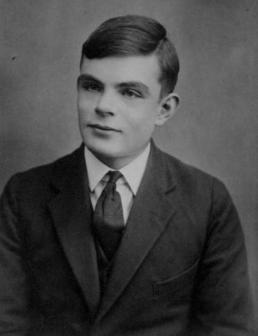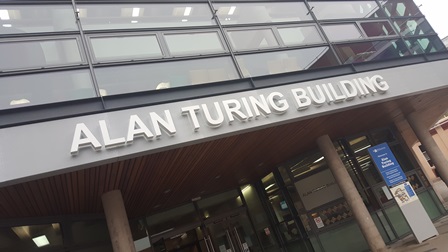
Building renamed in honour of Alan Turing
A University of Wolverhampton building has been renamed in honour of the brilliant mathematician and wartime code breaker Alan Turing.
The iconic building on the Wolverhampton Campus is home to the University’s Faculty of Science and Engineering’s computing and mathematics courses.
The building has been renamed the Alan Turing Building in part in recognition of the University’s commitment to Lesbian, Gay, Bisexual and Trans (LGBT) Rights and also of the mathematician’s outstanding contribution to the early years of computing.

A special event will be hosted by the LGBT staff network on Tuesday, 28 February 2017 to mark the occasion.
The event from 5pm will feature a talk about Alan Turing by Lecturer in Mathematics at the University, Liam Naughton, and University Secretary Dr Emma Wedge will speak about why LGBT equality is important to the institution.
There will be refreshments and tours of the building.
Dr Sammy Li, lecturer and Chair of University of Wolverhampton LGBT staff network, said: “We are delighted to be hosting a special event to celebrate the University’s commitment to LGBT Rights, including celebrating the naming of the Faculty of Science and Engineering building after Alan Turing. We are also launching new webpages for our LGBT staff and students to provide better information and signposting."

“Will Cooling, Equality and Diversity Special Projects and Policy Manager, said: “The University of Wolverhampton has a strong commitment to LGBT Equality as demonstrated by our recent improvement in the Stonewall Workplace Equality Index. A key aim of Tuesday’s event is to celebrate this progress with our LGBT Staff and Students but also to get their feedback about what more the University should be doing in terms of providing information and advice, holding public events and running services.”
Alan Turing (1912-1954) was a brilliant mathematician and a leading code-breaker during World War 2. His pre-war work laid down the theoretical plan for a programmable computer, and after the war he was closely involved in the design and programming of the world’s earliest computing machines.
Turing was prosecuted in 1952 for homosexual acts, when "gross indecency" was still criminal in the UK. Turing died in 1954, 16 days before his 42nd birthday, from cyanide poisoning.
In 2009, following an internet campaign, British Prime Minister Gordon Brown made an official public apology on behalf of the British government for "the appalling way he was treated”. The Queen granted him a posthumous pardon in 2013.
Further information
For more information please contact the Media Relations Office on 01902 32 2736 or 01902 518647.
Date Issued: Thursday, 23 February 2017
For more information please contact the Corporate Communications Team.


/prod01/wlvacuk/media/departments/digital-content-and-communications/images-2024/240328-Varsity-Line-Up-Resized.jpg)
/prod01/wlvacuk/media/departments/digital-content-and-communications/images-18-19/220325-Engineers_teach_thumbail.jpg)
/prod01/wlvacuk/media/departments/digital-content-and-communications/images-2024/240404-Digital-Humanities-Training-Resized.jpg)
/prod01/wlvacuk/media/departments/digital-content-and-communications/images-2024/240320-Uzbekistan-Resized.jpg)
/prod01/wlvacuk/media/departments/digital-content-and-communications/images-2024/240229-The-Link-Resized.jpg)
/prod01/wlvacuk/media/departments/digital-content-and-communications/images-2024/240404-Pharmacy-Students-Resized.jpg)

